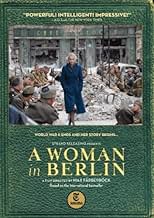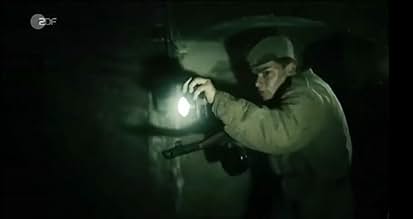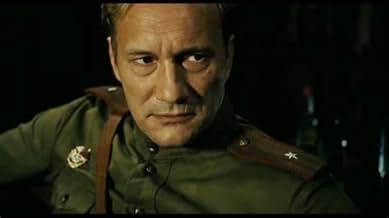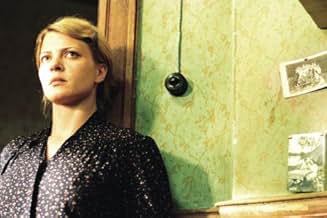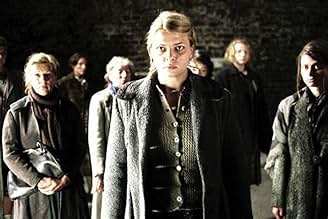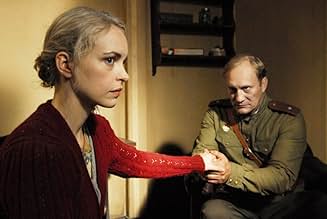AVALIAÇÃO DA IMDb
7,0/10
7,2 mil
SUA AVALIAÇÃO
Adicionar um enredo no seu idiomaA woman tries to survive the invasion of Berlin by the Soviet troops during the last days of World War II.A woman tries to survive the invasion of Berlin by the Soviet troops during the last days of World War II.A woman tries to survive the invasion of Berlin by the Soviet troops during the last days of World War II.
- Direção
- Roteiristas
- Artistas
- Prêmios
- 1 vitória e 4 indicações no total
Evgeniy Sidikhin
- Major Andreij Rybkin
- (as Evgeny Sidikhin)
Viktor Zhalsanov
- asiatischer Rotarmist
- (as Victor Zhalsanov)
- Direção
- Roteiristas
- Elenco e equipe completos
- Produção, bilheteria e muito mais no IMDbPro
Avaliações em destaque
ANONYMA - EINE FRAU IN BERLIN (A Woman In Berlin) is the painfully sensitive title of this exquisite film from writer/director Max Färberböck based on a once occult book by 'Anonyma' that has become a recent bestseller in Germany. It has the courage to tell the story of what it was like in Berlin as World War II was ending - the time of the Russian siege of the city just before and just after Hitler committed suicide, ending the horror of the Nazi regime. While many films have been made about the German populace and how they coped with the fall of their 'great Third Reich' country that was to rule the planet, few have been able to allow the audience to understand the brutalities of war on the people of Germany in so direct a fashion. It is a film that will haunt the viewer for a long time, a film that will restore some dignity to the German people who lived through it, not being part of Hitler's madness but being trapped in the ugliness that followed his fall.
Anonyma (Nina Hoss) is a journalist, a pretty woman living in the cellars and other hiding places while the Russians took over Berlin. She helps her fellow survivors of the bombing of Berlin, struggling for food and protection. The Russian soldiers, still angry with the gnawing hatred for the Germans from the Siege of Leningrad and the loathing of anything that exists in Hitler's Berlin, drink heavily and seek out the women from hiding to satisfy their insatiable lust. 'Berlin is a German whorehouse' and all women, from children to youngsters to elderly fraus are continually raped and beaten as part of the victors' rage. Anonyma speaks several languages including Russian and decides her only hope for survival is to align with the Commander of the troops, Major Andreij Rybkin (Yevgeni Sidikhin), believing that if she becomes his concubine she will be safe from the random raping by the rest of the soldiers. Their liaisons become more than outlets for the Major and the two gradually bond despite the horrors outside their rendezvous. They survive. Hitler commits suicide and the war is over and the two face the reality of returning to their previous pre-war lives...or can they?
Nina Hoss is brilliant in this difficult role and though the script allows her little to say, she conveys so much through her expressions that words are nearly unnecessary. Likewise, Yevgeni Sidikhin captures the dichotomy of emotional response his character must display, finding just the right balance between the conquering Russian soldier and the compassionate and vulnerable lover. The cinematography by Benedict Neuenfels captures the devastation not only of the buildings but also of the emotions of both sides of the participating groups and Zbigniew Preisner is responsible for the musical score that adds immeasurably to the drama. This is one of the great German films that took many years of maturing to make. It should be seen.
Grady Harp
Anonyma (Nina Hoss) is a journalist, a pretty woman living in the cellars and other hiding places while the Russians took over Berlin. She helps her fellow survivors of the bombing of Berlin, struggling for food and protection. The Russian soldiers, still angry with the gnawing hatred for the Germans from the Siege of Leningrad and the loathing of anything that exists in Hitler's Berlin, drink heavily and seek out the women from hiding to satisfy their insatiable lust. 'Berlin is a German whorehouse' and all women, from children to youngsters to elderly fraus are continually raped and beaten as part of the victors' rage. Anonyma speaks several languages including Russian and decides her only hope for survival is to align with the Commander of the troops, Major Andreij Rybkin (Yevgeni Sidikhin), believing that if she becomes his concubine she will be safe from the random raping by the rest of the soldiers. Their liaisons become more than outlets for the Major and the two gradually bond despite the horrors outside their rendezvous. They survive. Hitler commits suicide and the war is over and the two face the reality of returning to their previous pre-war lives...or can they?
Nina Hoss is brilliant in this difficult role and though the script allows her little to say, she conveys so much through her expressions that words are nearly unnecessary. Likewise, Yevgeni Sidikhin captures the dichotomy of emotional response his character must display, finding just the right balance between the conquering Russian soldier and the compassionate and vulnerable lover. The cinematography by Benedict Neuenfels captures the devastation not only of the buildings but also of the emotions of both sides of the participating groups and Zbigniew Preisner is responsible for the musical score that adds immeasurably to the drama. This is one of the great German films that took many years of maturing to make. It should be seen.
Grady Harp
In 1959,a book was published in Switzerland,entitled 'Anonyma:Eine Frau In Berlin',about a woman who had lived through the liberation of Berlin by the Red Army,in 1945,just mere months before Adolf Hitler committed suicide. This book shocked those who had read it,also resulting in it being immediately banned in Germany (although it was eventually published there many years later). In 2008,German film maker,Max Farberbock adapted this eye opening novel into a new film from the original novel by the author (Anonyma). The film stars the lovely to look at,Nina Foss as Anonyma,who's husband is seen shipping out for the elite S.S. squad of the German Army the very morning of the Soviet invasion of Berlin in 1945. For the next three months,she,as well as the rest of the residents of Berlin are subjected to brutal treatment of their captors. Determined to survive this nightmare,she forges a relationship with the Russian leader, Major Andrei Rybkin (played by Yevgeni Sidikhin,who commands a genuine presence here),as well as a renegade member of the German army,that is hiding in the attic of the apartment block she lives in. The rest of the cast is made up of both German & Russian actors who truly live up to their roles (and watch out for a winning performance by Irm Hermann, generally known for her work in the films of the late Rainer Werner Fassbinder,as Witke).Comparisons to Paul Verhoeven's 'Black Book' will be obvious. Benedict Neuenfels' camera work,which gives this film it's grainy,grim look & Ewa J.Lund's tight editing is right on track This grim,gritty film is yet,another winning entry from Constantin Film Produktion,who gave us the likes of 'Last Exit to Brooklyn',and the recent,'Der Bader Meinhof Komplex'. The film is a bit long in the tooth,but there isn't a slack moment in it's 131 minute running time. Spoken in German & Russian with English subtitles. Not rated by the MPAA,this film contains rough language, violence,flashes of nudity & sexual content,including several unpleasant rape scenes
I haven't read the diary, but my father has and after we watched this together, he said that they got everything from the compelling book with its important testimony. This review is based upon the version with a two hour running time and six minutes of credits. After Berlin was taken over by Russian soldiers(among them men who had not had sex for four years) at the end of WW2, and raped 100.000 women, leading to the death of 10.000 of them. When this was first revealed in the late 50's, the truth outraged many in the country. It was called an attack on the virtue of female Germans. Fortunately, it was re-released in 2003, and now this excellent adaptation has hit theaters. There is apparently also a longer cut, and if the standard of this is maintained, it is undoubtedly great and worth it. This is gripping from start to finish. It all comes across as real and authentic(helped by the fact that they speak the three languages they are supposed to), and since this is entirely objective and doesn't take any sides in the conflict, you feel for both groups. The acting performances are spot-on. This has some marvelous little touches and details, and it is historically accurate. The characters are complex and psychologically credible. This is immensely well-produced. The camera-work and editing put you right in the situation when this fits, and is in general expertly done. This has extraordinary lighting. There are a few light portions that keep it from being all sad(without it taking away from how touching and engaging the rest of it is). It is tense and unpleasant when it means to be, albeit it isn't outright depressing. The atmosphere is built up well. There is a bit of moderate sexuality, nudity of both genders, brutal violence and disturbing content in this. The DVD comes with a trailer for this and ones for other films. I recommend this warmly to everyone mature enough for it. What happened should never be forgotten. 8/10
A Woman in Berlin (2008)
Imagine the horrors of women caught in a large city during the chaos of war, with occupying troops storming your apartment building day after day. Well, think again. It isn't imaginable. I think even people who live through such things (and we are talking Berlin, 1945 for this movie) the truth is something that is pushed away. Because even watching a movie--a movie!--of these events is unbearable.
Not that the movie is unwatchable. Just the opposite. It's beautifully made, seeming to parallel that other recent German movie about the last days of the Nazi reign, "Downfall," 2004. But unlike that movie, this isn't about political history, or the history of war, or even the dramatization of historical figures as real people. This is a personal story, centering around one woman played by Nina Hoss, and about the repeated rape and abuse of women by the Russian troops for days and weeks on end. There was no escape, no power to complain to, no justice anywhere, anywhere, not German or Russian or even American (assuming they were any better) a mile or two away.
The movie is based on a book, "Anonyma," by a woman whose identity is not revealed, if it is even known (this was her protection even after death). The movie suffers now and then from a sameness, a steady pounding, beginning to end. The parade of horrors is continuous even as relationships develop and the first wave of anarchistic occupiers shifts to more entrenched troops and some general partying. You do cling to some semblance of progression, or of events to stand out from the others, but it's mostly about horribleness.
But maybe that's the way it should be. It was an endless nightmare on every level, even if you (they, these women) survive. In some ways, the end of the war is more believably insane here than in "Downfall" even though they are in many ways comparable movies, comparable moments. Such an array or gritty, believable acting and sets you won't find often. And thankfully, even the sentimental aspects are handled without swelling music and other cinematic tricks found too often this side of the Atlantic.
One last point, whatever you think of the Germans and WWII, here is yet another kind of national acknowledgment and, for many, soul-searching. This is a German film. The Russians don't come off great, for sure, but the Germans are clearly at fault, and are shown that way, and shown as responsible for even greater crimes. There's no glossing over any of it. Watch this movie. It won't be fun, but it'll be stirring and important.
Imagine the horrors of women caught in a large city during the chaos of war, with occupying troops storming your apartment building day after day. Well, think again. It isn't imaginable. I think even people who live through such things (and we are talking Berlin, 1945 for this movie) the truth is something that is pushed away. Because even watching a movie--a movie!--of these events is unbearable.
Not that the movie is unwatchable. Just the opposite. It's beautifully made, seeming to parallel that other recent German movie about the last days of the Nazi reign, "Downfall," 2004. But unlike that movie, this isn't about political history, or the history of war, or even the dramatization of historical figures as real people. This is a personal story, centering around one woman played by Nina Hoss, and about the repeated rape and abuse of women by the Russian troops for days and weeks on end. There was no escape, no power to complain to, no justice anywhere, anywhere, not German or Russian or even American (assuming they were any better) a mile or two away.
The movie is based on a book, "Anonyma," by a woman whose identity is not revealed, if it is even known (this was her protection even after death). The movie suffers now and then from a sameness, a steady pounding, beginning to end. The parade of horrors is continuous even as relationships develop and the first wave of anarchistic occupiers shifts to more entrenched troops and some general partying. You do cling to some semblance of progression, or of events to stand out from the others, but it's mostly about horribleness.
But maybe that's the way it should be. It was an endless nightmare on every level, even if you (they, these women) survive. In some ways, the end of the war is more believably insane here than in "Downfall" even though they are in many ways comparable movies, comparable moments. Such an array or gritty, believable acting and sets you won't find often. And thankfully, even the sentimental aspects are handled without swelling music and other cinematic tricks found too often this side of the Atlantic.
One last point, whatever you think of the Germans and WWII, here is yet another kind of national acknowledgment and, for many, soul-searching. This is a German film. The Russians don't come off great, for sure, but the Germans are clearly at fault, and are shown that way, and shown as responsible for even greater crimes. There's no glossing over any of it. Watch this movie. It won't be fun, but it'll be stirring and important.
Although I was aware of the awesomeness of German cinema in the past decades, I was still pleasantly surprised by this film. The title of the movie implies a specific point of view - the plight of a woman trapped in Berlin during the last days of WW2. The movie is however far less black-and-white (metaphorically speaking, of course) than it could have been. It goes beyond a simplistic right/wrong attitude and instead puts the audience in a position to ponder how in a war atrocities escalate and feed on themselves in a typical "chicken and egg" problem. Even the fact that the book on which the movie is based was met with outrage when it was first published in the 50's is ultimately part of this chain.
There are more complex answers to why horrible things happen in a war, and in the world in general - and Europe has had its share of it - and this film manages to capture these complexities masterfully.
There are more complex answers to why horrible things happen in a war, and in the world in general - and Europe has had its share of it - and this film manages to capture these complexities masterfully.
Você sabia?
- CuriosidadesThe source novel was virtually banned in West Germany when it was first published in the late 1950s. When it was republished in 2003, it became a huge bestseller and nationwide sensation in a reunified Germany.
- Erros de gravaçãoWhen Germany's surrender is announced, the Soviet troops start singing the "Alexandrov version" of their national anthem, adopted about a year earlier. That version had no lyrics until Stalin intervened, and the heavy fighting wouldn't have allowed the soldiers to learn them. They most likely sang the chorus of "The Internationale," an earlier, better-known version.
- ConexõesFeatured in History: Anonyma - Die Frauen von Berlin (2010)
Principais escolhas
Faça login para avaliar e ver a lista de recomendações personalizadas
- How long is A Woman in Berlin?Fornecido pela Alexa
Detalhes
- Data de lançamento
- Países de origem
- Central de atendimento oficial
- Idiomas
- Também conhecido como
- Anónima - Una mujer en Berlín
- Locações de filme
- Empresas de produção
- Consulte mais créditos da empresa na IMDbPro
Bilheteria
- Faturamento bruto nos EUA e Canadá
- US$ 294.014
- Fim de semana de estreia nos EUA e Canadá
- US$ 12.439
- 19 de jul. de 2009
- Faturamento bruto mundial
- US$ 1.863.939
- Tempo de duração2 horas 11 minutos
- Cor
- Mixagem de som
- Proporção
- 2.35 : 1
Contribua para esta página
Sugerir uma alteração ou adicionar conteúdo ausente

Principal brecha
By what name was Anônima - Uma Mulher em Berlim (2008) officially released in India in English?
Responda


